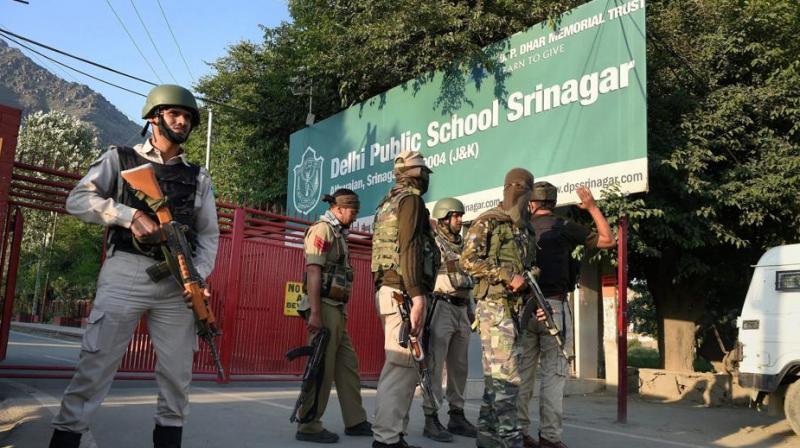Faulty politics, intel failures led to J&K tragedy

Whatever the promised Indian response to Jaish-e-Mohammad’s recent fidayeen attack on a CRPF convoy in Kashmir’s Pulwama district, which took dozens of lives, it is by now evident that India is not united in dealing with the terrorist outrage. The sincere expressions of solidarity by Congress president Rahul Gandhi and other top Opposition leaders appear to have gone in vain.
Never before has the country been faced with such a shocking state of affairs in dealing with externally-induced terrorism and its foreign patrons. Extreme right-wing elements have attacked the properties of Kashmiri people and other Muslims in Jammu, the state’s winter capital. Their retaliation is against fellow Indians, not the JeM and Pakistan. And the hyperactive official communications machinery as well as the BJP’s social media armies have not bothered to help ordinary people make this crucial distinction. The government and its bailiff in Kashmir, state governor Satya Pal Malik, are yet to take any meaningful deterrent action against the communal gangs.
The trouble has now spread to other states. At the behest of student and social outfits, which were earlier active in cow vigilantism and “love jihad” criminalities, hundreds of Kashmiri students in Dehradun and elsewhere have been turned away by their colleges. In reaction, Valley Muslims observed a shutdown on Sunday. In the 1965 and 1971 wars, Kashmiri Muslims had handed over Pakistani infiltrators to the police.
In order to underline the nation’s unity at a moment such as this, the government should have actively disseminated the idea that the people of Kashmir were victims of violence, and had nothing to do with the fidayeen attack. The complex politics of Kashmir is not reducible to a Hindu-Muslim binary, as communal elements here and the Pakistani State seek to do. It does appear that JeM has given communal elements in India the perfect gift as the Lok Sabha elections draw near.
This is the background in which we seek the understanding of other nations in the wake of the Pulwama attack. We are unlikely to be taken at face value. How the Pakistan-China axis responds to any Indian retaliation is an unknown. At a time when the US is negotiating with the Taliban, prior to ending its military presence in Afghanistan, Beijing is likely to run its policy close to Islamabad’s with an eye to creating leverage for itself in the post-American period there.
As we contemplate recent events, aside from the debilitating crass politics on display, two negatives stand out. The first of these is intelligence failure. The JeM had circulated a video just two days before the strike, indicating that an explosives-laden car would be used to create a major impact, but its meaning was not understood, although in January 2018 too, the Jaish had circulated a video before attacking a CRPF training compound in the same broad Awantipora area in Pulwama district. Earlier, in 2016, the CRPF had come under attack on the same road, at Pantha Chowk, not far from Awantipora.
Yet the intelligence professionals failed to link the latest JeM video to the unduly long CRPF convoy that the government was planning to move up the Jammu-Srinagar highway. They should have.
It would seem the JeM had advance knowledge of CRPF movements and had got ready the explosives and their fidayeen. It had done its homework. But our government had not. The J&K government, under Central rule, was found sleeping on the job.
The second failure concerns the CRPF itself for not considering it grossly unwise to move a convoy of as many as 78 vehicles, ferrying over 2,500 jawans, in a part of Kashmir which has been a site of encounters on a near daily basis for two and a half years.
Besides, it is evident that existing protocols were not adhered to, and this seems a regular failing with the CRPF. This force seems particularly vulnerable when it moves its jawans, as has also been seen repeatedly in Naxal-affected parts of Chhattisgarh.
Should politicians in top positions readily give a terrorist attack by a Pakistan-based group a religious and a partisan twist? And if they do so, should they not be disciplined? It won’t do to single out the Kashmiri separatists alone for admonition, although in this case they would have been as surprised as anyone else by the strike at the CRPF convoy.
It is to be regretted that a senior Jammu BJP politician who is a minister of state at the Centre wore his communal colours on the sleeve by publicly attacking leaders of the mainstream parties in the Kashmir Valley for being “apologetic” about terrorists. This travesty of the truth was peddled on the day that the Abdullahs — the father and the son — as well as Mehbooba Mufti had condemned the terrorist action at Pulwama in no uncertain terms.
Unfortunately, J&K governor Satya Pal Malik too disregarded his constitutional status — which enjoins on him to remain above the fray — to target mainstream politicians without any reason at a time when the state is under Central rule, the local politicians having been evicted from government in questionable circumstances.

